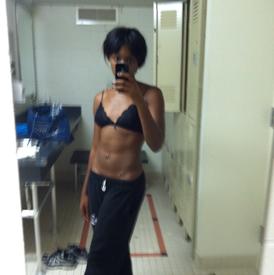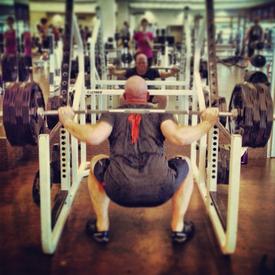Why you will NEVER lose weight doing just weight-lifting!

aj_rock
Posts: 390 Member
Hey guys! I tend to nerd out about a few fitness things, and in an attempt to single-handedly revolutionize the fitness industry, I wanted to see if I could turn the energy we spend lifting heavy stuff into useful energy (to say light a lightbulb)!
To my dismay, this will NEVER work! Why you ask?
A little bit of math (I'll keep it simple):
So when you lift something, you give it 'potential energy' , called U. U is equal to the weight * gravity * how high it is lifted.
Or. U = mgh
Using a simple example... take m = 225 (nice number for a bench press) pounds, which is the same as 100kg.
g = 9.81, as usual
h = 0.5 meters, being generous in how long your arms are.
Multiply 'em all together to get... wait for it....
490 Joules of energy! Sounds like a lot, right?
Erm, well, no.
1 kilocalorie, or better known as a FOOD calorie, is 4.2 KILOJoules.
converting units, you get 0.12 kilocalories out of a single rep.
So even if you can he-man out 10 reps, you've burned a grand total of.... 1 calorie. Whoopee.
But you cry "the human body is inefficient! It MUST burn more than that!" Ok, popular figures seen here:
http://mb-soft.com/public2/humaneff.html
and here:
http://secondlawoflife.wordpress.com/tag/energy-efficiency-human-body/
Estimate the efficiency at best a 1/4 and at worst 1/20th. So that's up to 20 cals for a single set. Which doesn't adjust for the metabolic compensation the body goes through during exercise (your body takes energy from other processes in the body in order to fuel exercise as well as burn additional energy). At best, we can probably expect around 5 calories per set of additional burn.
So a standard 6 set/bodypart full body workout has about 40 sets, expending about 160 calories. Not exactly a huge fat burning advantage.
Bottom line: between cardio and diet, SOMETHING ELSE needs to be done besides going to the gym!
Oh, and for my original plan of producing energy? An energy-efficient lightbulb rates at 12kWh. Mathing it out (12*3600/4.2 for unit conversion) gets you over 10000 calories to power a single energy-efficient lightbulb for an hour.
Even taking your single workout to be 200 calories and 100% energy conversion, you could power that lightbulb for 5 minutes. Guarenteed it took you about an hour to exercise that 200 calories off doing weight-lifting too.
So we won't be powering our nations with the fruits of our obesity pandemic anytime soon
Please let me know if any of my math is wrong!
Also, let it be noted that while weightlifting can't power much, cardio work DOES exert enough energy to power a treadmill while you run on it! Someone else had this idea already though -_-
To my dismay, this will NEVER work! Why you ask?
A little bit of math (I'll keep it simple):
So when you lift something, you give it 'potential energy' , called U. U is equal to the weight * gravity * how high it is lifted.
Or. U = mgh
Using a simple example... take m = 225 (nice number for a bench press) pounds, which is the same as 100kg.
g = 9.81, as usual
h = 0.5 meters, being generous in how long your arms are.
Multiply 'em all together to get... wait for it....
490 Joules of energy! Sounds like a lot, right?
Erm, well, no.
1 kilocalorie, or better known as a FOOD calorie, is 4.2 KILOJoules.
converting units, you get 0.12 kilocalories out of a single rep.
So even if you can he-man out 10 reps, you've burned a grand total of.... 1 calorie. Whoopee.
But you cry "the human body is inefficient! It MUST burn more than that!" Ok, popular figures seen here:
http://mb-soft.com/public2/humaneff.html
and here:
http://secondlawoflife.wordpress.com/tag/energy-efficiency-human-body/
Estimate the efficiency at best a 1/4 and at worst 1/20th. So that's up to 20 cals for a single set. Which doesn't adjust for the metabolic compensation the body goes through during exercise (your body takes energy from other processes in the body in order to fuel exercise as well as burn additional energy). At best, we can probably expect around 5 calories per set of additional burn.
So a standard 6 set/bodypart full body workout has about 40 sets, expending about 160 calories. Not exactly a huge fat burning advantage.
Bottom line: between cardio and diet, SOMETHING ELSE needs to be done besides going to the gym!
Oh, and for my original plan of producing energy? An energy-efficient lightbulb rates at 12kWh. Mathing it out (12*3600/4.2 for unit conversion) gets you over 10000 calories to power a single energy-efficient lightbulb for an hour.
Even taking your single workout to be 200 calories and 100% energy conversion, you could power that lightbulb for 5 minutes. Guarenteed it took you about an hour to exercise that 200 calories off doing weight-lifting too.
So we won't be powering our nations with the fruits of our obesity pandemic anytime soon
Please let me know if any of my math is wrong!
Also, let it be noted that while weightlifting can't power much, cardio work DOES exert enough energy to power a treadmill while you run on it! Someone else had this idea already though -_-
0
Replies
-
interesting0
-
:noway:
my brain hurts after reading this0 -
I did find this quite interesting but would like to note a few points.
You only talked about the UU on the way down, it takes more energy to lift it up than that to bring it down so your 1 cal/10 reps under represents this, probably closer to 3 cals, before adding your efficiency calculation. Another issue here is you are applying physics whereas you should be looking at biology, the way the body reacts to these things has less to do with physics then the assumptions you made.
Not to mention the after burn. when you finish lifting your metabolism stays elevated for up to 48 hours as it repairs the muscle damage caused from lifting. And weight loss is 80% diet so you can actually lose weight and not do any cardio or weights.0 -
The thing is... math (at least from what I've seen) never accounts for everything in weight loss. There is not only the minor issue that muscle burns more than fat, there is also the issue that people who lift act differently. They go home and toss their toddlers in the air. They get into arm-wrestling competitions with their friends. They start taking better care of their bodies so that they can lift more, and thus end up getting more sleep and all the other things that help their bodies get into shape.
So while you're right that we all need to balance our fitness programs, I do think that there is more to weight-lifting than math.
And if it's just about power from obesity, we could always spend our time lifting more fruits and vegetables onto our plates. That would have to help, right? ;-)0 -
And weight loss is 80% diet so you can actually lose weight and not do any cardio or weights.
You could also not diet and just start doing a lot of cardio and you could have significant weight loss. That 80% number is just what generally is done, but not a 'requirement.'0 -
Hasn't it been proved that actually muscle doesn't really burn all that much at rest?0
-
And weight loss is 80% diet so you can actually lose weight and not do any cardio or weights.
You could also not diet and just start doing a lot of cardio and you could have significant weight loss. That 80% number is just what generally is done, but not a 'requirement.'
True but it is much easier to cut 500 cals out of your diet than it is to burn 500 cals.0 -
As you correctly pointed out, the immediate calorie burn to weight training is not really significant. But a very real benefit is the extra calorie burn of your increased metabolic rate since that is partially dependent on your over all muscle mass. The bad news is that putting on extra muscle is a long, hard- work process. More bad news. If you don't do something to keep the muscle mass you have, as you age it will diminish. You will lose strength, flexibility , balance AND your precious metabolic rate. I had patients in the nursing home who lived on 800 calories a day and were too weak to walk to the bathroom unassisted. So keep adding those reps and sets to that treadmill run! Your body will love it! Good luck!0
-
Not true for every one!
My mother use to do weight lifting and that was it. every day for months and for about an hour or over and she watched what she ate, and she was tiny and had some nice muscles back in the day. so every one is different. Running and stuff is better any ways because yes it burns more and faster.0 -
You're right on, regarding the physics of the energy exchange going on while lifting weights - in so far as the change in the weight's gravitational potential energy. But, there are a lot of other factors to consider as well, even beyond efficiency. What about the caloric cost of repairing the body after a weight-lifting session? What about the increased heart-rate associated with physical exertion; one can definitely switch off between sets working one muscle group while allowing another muscle group to rest.
I had great success losing weight by combining a sensible weight training schedule with proper warm ups and warm downs as well as changes to my diet in the past. Sure - if you want to maximize the calories you're burning during exercise, weight training probably isn't the way to go. But, I do think that weight training is an important part of living a healthy lifestyle, which should also include sensible eating and cardio.
I'm intrigued, though, at how exactly the body responds to weight training, and how that translates to burning calories. I'll try to find some more information on this and get back to you!0 -
And weight loss is 80% diet so you can actually lose weight and not do any cardio or weights.
You could also not diet and just start doing a lot of cardio and you could have significant weight loss. That 80% number is just what generally is done, but not a 'requirement.'
True but it is much easier to cut 500 cals out of your diet than it is to burn 500 cals.
Speak for yourself! To cut 500 cals out of my diet I'd be on 1000 a day. I'd much rather go for a run!0 -
I did find this quite interesting but would like to note a few points.
You only talked about the UU on the way down, it takes more energy to lift it up than that to bring it down so your 1 cal/10 reps under represents this, probably closer to 3 cals, before adding your efficiency calculation. Another issue here is you are applying physics whereas you should be looking at biology, the way the body reacts to these things has less to do with physics then the assumptions you made.
This. That biology point is a big one.
Plus you have to account for your bodyweight as well, which is going to come into play during the big exercises like squats.
Also, I'm seeing some hints of dichotomous thinking in the replies here. Make sure we're not framing this as strength training OR cardio. I've said time and time again that I let metabolic work bolster the calorie deficit since it's energy costly and let strength training manage the muscle maintenance while dieting.
Looking good nekid is about a lot more than energy deficits and general tissue loss.
Also, let's not forget that we can't categorically call it "weight training" or whatever. Lifting weights can be purely metabolic and it can be purely CNS-intensive. Meaning it can be aerobic, low load, continuous exercise and it can be anaerobic, high force output, intermittent exercise. We need to be very careful with out categorizations as this will impact that biology side of things greatly in terms of energy expenditure and adaptations.0 -
:noway:
my brain hurts after reading this
My brain hurt after looking at this. :huh:0 -
And weight loss is 80% diet so you can actually lose weight and not do any cardio or weights.
You could also not diet and just start doing a lot of cardio and you could have significant weight loss. That 80% number is just what generally is done, but not a 'requirement.'
If you only learn how to lose weight through exercise, what happens when you break your leg? How does the person with blood pressure that reads higher than 159/ 85 exercise? Cutting 500 calories from your diet is much easier than burning 500 calories through exercise.0 -
Seriously? Are you being serious, OP?
Either you are trying to troll a good number of people into giving up their weight loss goals because /your/ math "doesn't add up", or you're just being a *kitten*. Everyone, listen! Don't over complicate this!
You go to the gym, you lift, you expend more energy than you consume daily: you lose weight! You want fat loss? Do a lot of cardio. You want to sculpt your body? Lift heavy, really heavy.
Yes, this message is going to come across to some as harsh. That's okay, be offended. But the OP has done exactly the same type of thing that spreads misinformation, celebrity diets, and snake-oil salesmen - intentionally, or not. I'm not trying to downplay knowledge though. If you want to know the math, go find it. /Scientists/ have already done the work. Studies have been published and peer reviewed with as accurate information as it can be.
Also, this is off topic; but a good read.
http://www.leangains.com/2011/09/****arounditis.html
edit: profanity filter is messing with the link. Just hit leangains.com for the article.0 -
Wow what a response! A couple notes:
I know its rough and doesn't account for all biology. The idea was that, even with ideal condition assumptions being made, you cannot possibly come close to expending the amount of energy needed to make a significant difference in weight loss goals. Like I said, my original reason for doing these estimates was to see if food chemical energy could be reliably converted to electrical energy for power generation, and unless my number are off by a factor of like 100, it simply can't be done.
As for the actual biology, yes I missed the fact that on reps you lower the weight under control, expending yet more energy. It also doesn't account for kinetic energy. But i think the efficiency values I quoted are accepted by other more professional sources than myself, and thinking that you expend 5 calories for every 1 calorie worth of work done is pretty close.
Also, look at MFP's recommendations for calories spent weight-lifting. My final numbers, after adjusting for lowering the bar, are probably quite close.
Steve, you're 100% about the squat thing, but at the same time, squats really do exert your body on a level closer to cardio work than most other exercises. I think the example of a bench press at a standard weight that makes my calculations rather easy is reasonable.
kneeki: not sure what side of the bed you woke up on this morning, but this is just a thought experiment. The title was to get people just to read the darn thing, and I'm preeeeetty sure I didn't end up making any recommendations that aren't already common knowledge; combine diet, cardio, and weight-lifting to acheive your goals.0 -
Again we come to the collective conclusion that you should ideally do a range of activities that incorporate strength AND cardio.
Like every other debate on this subject.0 -
I rarely pay attention to posts that tell me I CAN'T do something, or that something will NEVER work.
That being said, I'm out.0 -
Seriously? Are you being serious, OP?
Either you are trying to troll a good number of people into giving up their weight loss goals because /your/ math "doesn't add up", or you're just being a *kitten*. Everyone, listen! Don't over complicate this!
You go to the gym, you lift, you expend more energy than you consume daily: you lose weight! You want fat loss? Do a lot of cardio. You want to sculpt your body? Lift heavy, really heavy.
Yes, this message is going to come across to some as harsh. That's okay, be offended. But the OP has done exactly the same type of thing that spreads misinformation, celebrity diets, and snake-oil salesmen - intentionally, or not. I'm not trying to downplay knowledge though. If you want to know the math, go find it. /Scientists/ have already done the work. Studies have been published and peer reviewed with as accurate information as it can be.
Also, this is off topic; but a good read.
http://www.leangains.com/2011/09/****arounditis.html
edit: profanity filter is messing with the link. Just hit leangains.com for the article.
^^ THIS MADE MY HEART SMILE. : ) :flowerforyou:0 -
And weight loss is 80% diet so you can actually lose weight and not do any cardio or weights.
You could also not diet and just start doing a lot of cardio and you could have significant weight loss. That 80% number is just what generally is done, but not a 'requirement.'
True but it is much easier to cut 500 cals out of your diet than it is to burn 500 cals.
Speak for yourself! To cut 500 cals out of my diet I'd be on 1000 a day. I'd much rather go for a run!
How many calories would you need to eat to maintain your current weight? I'm betting that 1500 cal a day you're already eating is giving you a nice calorie deficit so you are already cutting out 500 cal (give or take since I don't know your exact weight and I'm speaking hypothetically) out of your diet. 0
0 -
Only halfway through, but THAT is a great article! Thanks!0 -
I guess I woke up on the side that makes me fierce.kneeki: not sure what side of the bed you woke up on this morning, but this is just a thought experiment. The title was to get people just to read the darn thing, and I'm preeeeetty sure I didn't end up making any recommendations that aren't already common knowledge; combine diet, cardio, and weight-lifting to acheive your goals.
Your titling of this is what upsets me most. People come looking for facts. More often than not, people often find something on the net, and spout it as an absolute via word of mouth, or some other social mechanism. I've got no doubt someone read what you wrote, and took it as 100% accurate. I'm not saying someone gave up in their goals simply because you made the post. But it's the same detrimental path. If you really want to help the community via this scientific method, account for as many variables as you can, and get it right! Studies take years for a reason. Napkin math is napkin math. 0
0 -
I did nothing but lift weights for the past 21 years, only recently did i incorporate cardio into my lifestyle along with cross fit type interval training. I'm with knneki on this one bro, be careful what you post, people on here are new to dieting and weight lifting, so if you tell them not to lift weights which will help them then they wont.. You know weight lifting is good for everyone whatever their goal is so why confuse them with these calculations? This is as bad as a fad diet craze giving those who were maybe on the fence of deciding to incorporate weight lifting into their routine a chance to back out based on this post, so they lose all the benefits of weight lifting...surely you can see that...I am sure your message was sincere but if it talked people out of lifting weights, be it actual weights or bodyweight, what did you accomplish?0
-
I would hope that anyone who could actually FOLLOW what I wrote would be above and beyond accepting random bits of advice. Maybe the title was a little sensationalist and maybe I should have put this in the chit-chat area, I apologize, b/c it wasn't meant to be taken seriously, but I can't change that now anyways. If I really have the power to talk people into/out of things with random bits of math, then my apologies again, there are far more devious things I can do to undermine the man and establish my base of supreme POWA!
At the same time, I wasn't aware fierce = name-calling & personal attacks via teh interwebs. I'm sure it was simply math-nerd induced rage as can be seen when someone is vehemently opposed to a statement.
Irresistible tangent, I read about the ****arounditis earlier today and agree that it is an awesome article!0 -
I don't know the equations personally but if what you say is true, then the act of actually lifting the weight may not burn a significant amount of calories but a second order effect is an increased heart rate. If I'm averaging 120 - 145 bpm over the course of 60 minutes of weight lifting, my body is burning almost 1000 calories. Same for a run where my heart rate is in the same zone. The results of each, completely different.0
This discussion has been closed.
Categories
- All Categories
- 1.4M Health, Wellness and Goals
- 398.2K Introduce Yourself
- 44.7K Getting Started
- 261K Health and Weight Loss
- 176.4K Food and Nutrition
- 47.7K Recipes
- 233K Fitness and Exercise
- 462 Sleep, Mindfulness and Overall Wellness
- 6.5K Goal: Maintaining Weight
- 8.7K Goal: Gaining Weight and Body Building
- 153.5K Motivation and Support
- 8.4K Challenges
- 1.4K Debate Club
- 96.5K Chit-Chat
- 2.6K Fun and Games
- 4.8K MyFitnessPal Information
- 12 News and Announcements
- 21 MyFitnessPal Academy
- 1.6K Feature Suggestions and Ideas
- 3.2K MyFitnessPal Tech Support Questions


















